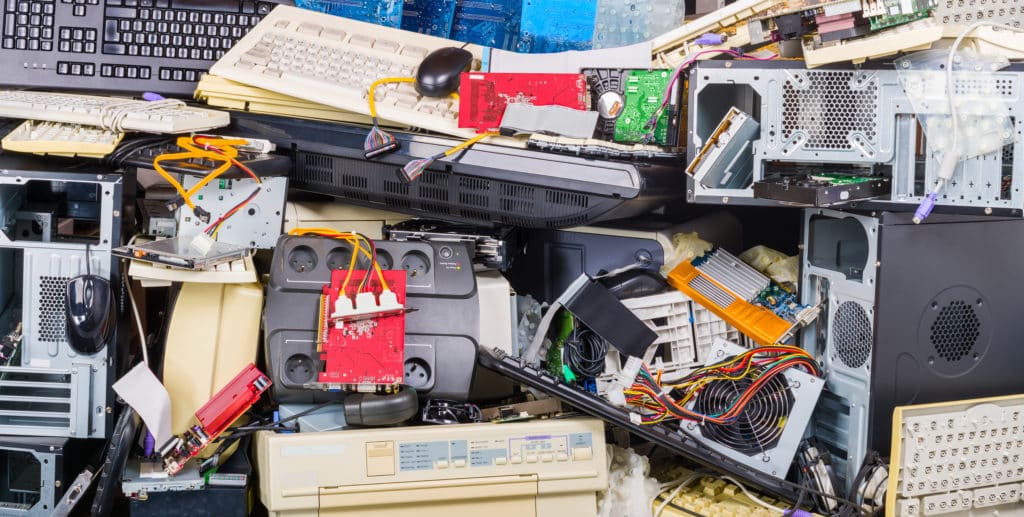Everyone has one. That box, drawer or shopping bag in a closet filled with old cell phones, obsolete chargers, broken tablets and defunct MP3 players. It’s our personal piles of electronic waste. According to government agencies, these piles are getting bigger, forcing us to consider why e-waste recycling is important.
Recycling electronic waste (e-waste, sometimes called e-scrap) has become an increasingly important environmental issue as the useful life of electronic devices becomes shorter and shorter and the list of electronic gadgets we use becomes longer and longer. E-waste recycling benefits are numerous and the need to address these items in the solid waste stream is becoming more urgent.

There are many factors to consider when evaluating electronics recycling, but here are the most significant reasons why e-waste recycling is important.
- It’s critical to keep electronic waste out of landfills. The EPA has stated that e-waste is dangerous when improperly disposed of. Electronic devices are comprised of toxic substances and heavy metals. Materials such as chromium, cadmium, mercury and lead can leach into the soil contaminating the air and waterways. EPA estimates there are about 60 million tons of e-waste per year globally. Recycling this material will save landfill space. For these reasons, there are numerous state laws that now ban e-waste in landfills.
- Electronic products are comprised of valuable materials such as precious metals like gold, silver and platinum along with copper, aluminum, plastic and glass. Through the recycling process, these materials can be reclaimed. Most electronic devices are nearly 100 percent recyclable. It would be poor stewardship to landfill these materials.
- Reclaiming valuable materials from the recycling process means there will be decreased demand for new raw materials. This will help conserve important natural resources. According to the EPA, one metric ton of circuit boards contains 800 times the amount of gold mined from one metric ton of ore.
- Using recycled material will also help reduce greenhouse gas emissions produced when manufacturing or processing new product known as “virgin material.” The more recycled material is available, the lower the demand for virgin material.
- Discarded electronic devices can also be kept out of the landfill if they are refurbished, reused and donated to a worthy cause. A quick Google search will provide a list of organizations in most areas that rebuild old electronics and provide them to those who otherwise would go without. “Reuse” is an important component of keeping material out of the waste stream. The EPA’s webpage has a listing of donation programs, at: epa.gov/recycle/electronics-donation-andrecycling#where
E-waste may make its way into scrapyards, mixed in with cars, old appliances and industrial scrap handled by the scrap metal recycling industry. Individual recyclers have different approaches for how to handle these items, but more progress is being made on how to extract valuable material and move these items through the recycling process.
ScrapWare Corporation, of Rockville, MD, provides and services software supporting the scrap metal recycling industry and has observed the industry increasingly deal with electronics as part of the waste stream.
Municipalities and manufacturers are also playing a role in managing e-waste. When state and local governments evaluate a recycling program, more are considering how to manage e-waste as part of their waste disposal system. According to the National Conference of State Legislatures, 25 states and the District of Columbia have laws regulating e-waste. On the manufacturing end, products such as mobile phones have been designed to become obsolete faster and faster. Manufacturers are now being encouraged to develop products with longer life spans as one component of the e-waste management strategy.
These are just some of the factors involved with recycling e-waste, the environmental issue of the future.
As our piles—or mountains–of discarded laptops, fax machines and copiers reaches impressive heights, it is clear that this e-waste is the world’s fastest growing trash stream.
About ScrapWare Corporation: Since 1989, Rockville, Maryland-based ScrapWare Corporation has been the software of choice for the recycling industry. Its ease of installation and simplicity saves users time and money, while helping them achieve compliance and maintain accurate business insights. With state-of-the-art functionality that‘s tailored to each organization’s unique requirements, ScrapWare is an advanced dynamic software solution that alleviates the most pressing recycling industry worries. For more information, please call (301) 517-8500 or visit https://www.scrapware.com/.
